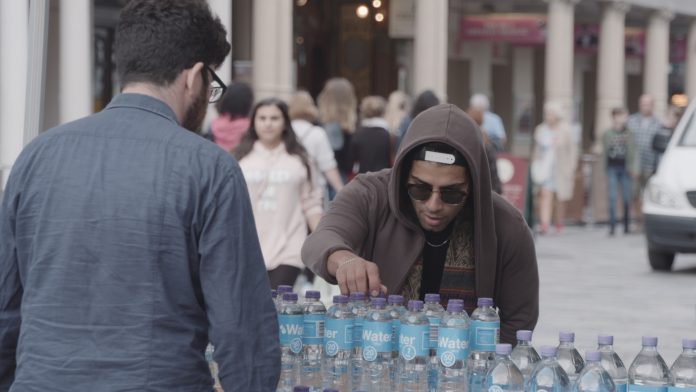Reelmedia’s film “How Far Would You Walk for Clean Water?” was shown globally, on UNICEF’s social media channels, to highlight the situation of children in Somalia, especially around the difficulty of getting clean water. It was seen by over 10 million people. Tim Webster, the film’s director, writes about making the video.
In partnership with UNICEF, Reelmedia wanted to relay the reality of the drought in Somalia to a Western audience. How could we provoke a response in viewers by making them think differently about their own easy access to water and to consider the situation faced by Somali children, who walk long distances to find it?
We decided to carry out a social experiment which would, as far as possible, put people in the shoes of children in Somalia. Using hidden cameras, we would let the experiment play out and film the results and the reactions of people secretly.
For one day, a stall in a busy street would ‘sell’ water to thirsty shoppers, commuters, and tourists. To the initial confusion of customers, in place of normal price tags, bottles were labeled with the numbers of kilometres that children typically walk to find water in Somalia.
To startle people out of their comfort zones, a situation was set up: if a customer was interested in purchasing a bottle of water, they were asked to walk that number of kilometres on a treadmill, placed next to the stall.
Hidden camera videos are exciting to produce because although they can be planned, they are ultimately unpredictable. How would people react to our experiment? Would anyone take time out of their day to take up the challenge and walk for their water?
We set up three hidden cameras away from the crowded street and waited for customers to arrive. To our surprise, a stream of people were drawn to the stall, intrigued by the peculiar pricing. Since it was a hot summer’s day, many passers-by were interested in purchasing water, but not so many were keen in taking time out of their day to walk for their water, when usually it would be so easy. Reelmedia FilmReelmedia chose an unconventional way to draw attention to the dire situation facing Somali children as they attempt to find water.
Reelmedia FilmReelmedia chose an unconventional way to draw attention to the dire situation facing Somali children as they attempt to find water.
In the end, only a handful of people took up the challenge to walk for their water – and the distances they completed were just a small fraction of the number Somali children typically walk each day. Those who did complete the required distance were awarded a bottle of water – much appreciated after walking in the afternoon sun.
Customers took big sips of water before the stall holder asked them to first read the ingredients on the label. A list of deadly diseases was read out, to the initial confusion of customers. Some were left speechless, others looked distressed and some expressed frustration over the thought of children having to walk so far, only to receive potentially deadly water at the end. Their astonishment and dismay quickly turned to empathy and understanding.
The success of the experiment was better than our expectations, not only because the reactions of the public were more dramatic than we had hoped for, but because those that chose to follow in the footsteps of Somali children, even if only partly, showed a genuine sense of compassion for their plight. We hope that by capturing the thought process participants went through on camera, that empathy is transferred to a wider audience, who will then be moved to taking practical action.
In April 2017, the UNICEF Somalia and East and Southern Africa Regional (ESARO) Offices were looking for a new way to raise awareness about the drought affecting millions of people in Somalia. The crisis was getting worse by the day, with thousands of Somalis fleeing home in search of water. Kun Li (Somalia) and Nicholas Ledner (ESARO), decided they wanted to bring this message to the widest possible audience through social media, ideally by bringing the issue to a global public. They decided the best way to do this was through a ‘social experiment’ video which used hidden cameras to capture people’s reactions when they were confronted with a proposition. Through previous video efforts, they knew this was an effective way to reach people with social media, so they recruited the creative agencies that presented the boldest idea to emphasize how far Somalian families needed to walk for water. Ultimately an agency called Kindvertising came up with the winning concept, which then resulted in the production of “How Far Would You Walk for Clean Water” created by Reelmedia.
Tim Webster is the director of Reelmedia Film, and of the video.
By Tim Webster




























